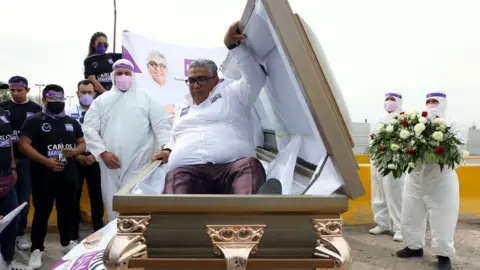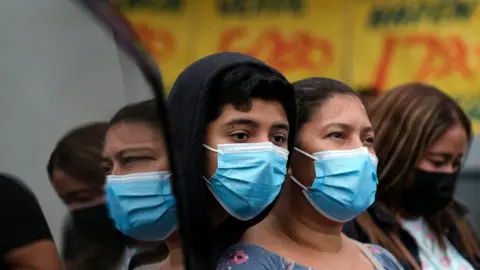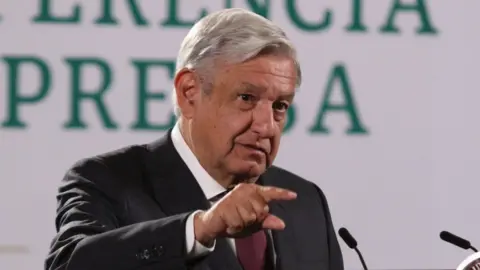Mexico mid-terms marred by threats, attacks and killings
 AFP
AFPMexico's mid-term elections on Sunday have been marred by one of its bloodiest campaigns, even in a country known for its drug cartel wars and soaring homicides.
President Andrés Manuel López Obrador's governing National Regeneration Movement (Morena) party and its allies are hoping to head off an opposition challenge and keep their majority in the lower house of Congress.
But in recent weeks, Mexican media have been running daily stories of threats, kidnappings, attacks and murders committed against candidates, campaign aides and election officials, that have mostly been blamed on the country's powerful drug cartels and crime groups that permeate local politics.
The cartels - or the "party of organised crime" as government officials call them - have been using bribery and violence to try to influence many of the election races, seeking to lever in candidates favourable to their interests.
Some observers conservatively report an election campaign toll of nearly 90 killed, but others say the number of election-related homicides is closer to 150.
"The election is 6 June, but [organised] crime has already voted," commentator Paola Rojas wrote in leading Mexican daily El Universal on 31 May.
Pandemic handling will be judged
On the political front, Sunday's elections are being viewed as a referendum on the leftist rule of 67-year-old López Obrador, who is popularly known by his initials, Amlo.
The Mexican leader is half way through his six-year term, and the vote will test popular support for his so-called 4T (Fourth Transformation) reformist government project aimed at ending the privileges and corruption of Mexican elites and improving the lot of ordinary citizens.
 AFP
AFPDespite maintaining high approval ratings compared to many of his Latin American peers, Mr López Obrador and his administration have faced increasing criticism for their handling of the Covid-19 pandemic - Mexico remains a regional hotspot - and also for their failure to curb the power of the drug cartels and the crime and violence they inflict on Mexican society.
Some critics say the government has surrendered to the cartels, while others chastise the president for prioritising prestige infrastructure projects, such as his Maya Train railway plan, while coronavirus deaths and cases have continued to rise.
Close battle for the lower house
The Mexican leader has also faced media scrutiny at home for his sensitivity to criticism, which some detractors say reveals an authoritarian streak. Relations with northern neighbour the United States have been troubled by concerns over intelligence co-operation in fighting the cartels.
Despite this, Mr López Obrador's Morena party and its allies are aiming to try to hold on to their majority in the lower house of Congress they gained in the 2018 elections, so they can continue to push through legislation in support of the president's agenda.
 Getty Images
Getty ImagesMexico's main opposition parties have formed an electoral and legislative alliance, and are seeking to overturn the government's dominance in the legislature.
Recent opinion polls suggest the governing Morena coalition could still come close to retaining its lower house super-majority - 334 seats are required for this - but the battle could be hard fought.
More diverse candidates
With more than 21,000 elected posts at stake, including 500 federal legislators seats, 15 of the 32 state governorships, members of 30 state congresses and nearly 2,000 mayors' positions, the election is being described by observers as the largest and most competitive in Mexico's history.
And although the electoral violence of recent weeks has been depressingly familiar, one brighter spot has been signs of greater diversity in the thousands of candidates running for office.
 AFP
AFPDaily Excelsior reported on 6 April that there were 43 LGBTQ candidates - a new record for this group - 57 immigrants, 57 individuals with disabilities, 28 from the Afro-Mexican community and 98 members of indigenous communities participating in the elections.
